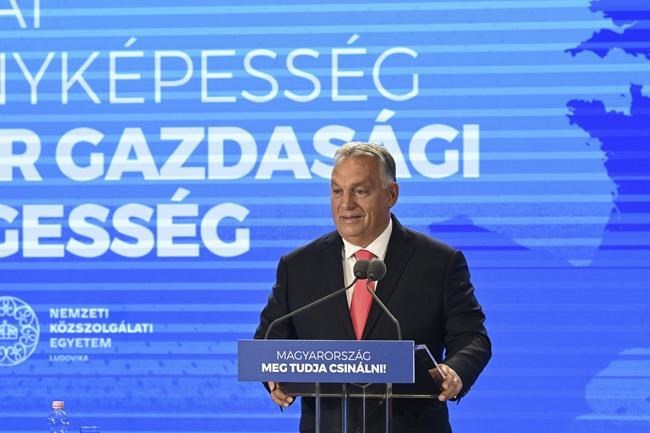
Hungarian Prime Minister Viktor Orban speaks during a conference at the Ludovika University of Public Service, in Budapest, Hungary, Wednesday, Sept. 25, 2024. (Szilard Koszticsak/MTI via AP)
October 03, 2024 - 5:54 AM
BRUSSELS (AP) — The European Union announced on Thursday that it is taking Hungary’s right-wing government to court over laws that could allow the authorities to investigate and prosecute people accused of undermining the country’s sovereignty.
The “ sovereignty protection act ? took effect in December. It created a government authority with the power to gather information on any groups or individuals that benefit from foreign funding and influence public debate. Hungary’s secret services can assist in the authority’s investigations.
Hungarian Prime Minister Viktor Orbán’s government maintains that the act is designed to prevent political parties from receiving funding from abroad for election campaigns.
But opponents have compared it to Russia’s “foreign agent” law, which considers anyone receiving financial support from abroad, including journalists and advocacy groups, to be an agent of another country.
They believe the broad language of the Hungarian law can be used to arbitrarily target government critics including non-governmental organizations and journalists. Anyone convicted of a violation can face prison terms of up to three years.
The EU’s executive branch, the European Commission, said that it was referring Hungary to the Court of Justice because it had failed to address concerns over likely breaches of the bloc’s fundamental rights, including the right to privacy and to freedom of expression and association.
In June, the authority tasked with defending against foreign influence launched an investigation into the Hungarian branch of anti-corruption organization Transparency International. Media have also been targeted.
The commission said the sovereignty protection office has such broad powers that it can “intervene in an intrusive manner in investigations.” Its probes and findings must be given extensive publicity, which is likely to have “a stigmatizing effect” on those targeted.
“The broad powers and discretion of the office will affect a wide range of persons and entities, including civil society organizations, media outlets and journalists in a disproportionate manner,” it said.
The court action is just the latest salvo in a long-running battle between Brussels and Budapest.
In 2022, the commission blocked substantial amounts of money out of concern that democratic backsliding by Orbán’s government could put the bloc’s common budget at risk.
Hungary currently holds the EU’s rotating presidency, until the end of December. Right at the start of its term, Orbán visited Moscow to discuss prospects for a peaceful settlement in Ukraine with Russian President Vladimir Putin, deeply angering his EU partners.
Many countries are protesting by only sending lower-level officials to meetings held in Hungary.
News from © The Associated Press, 2024